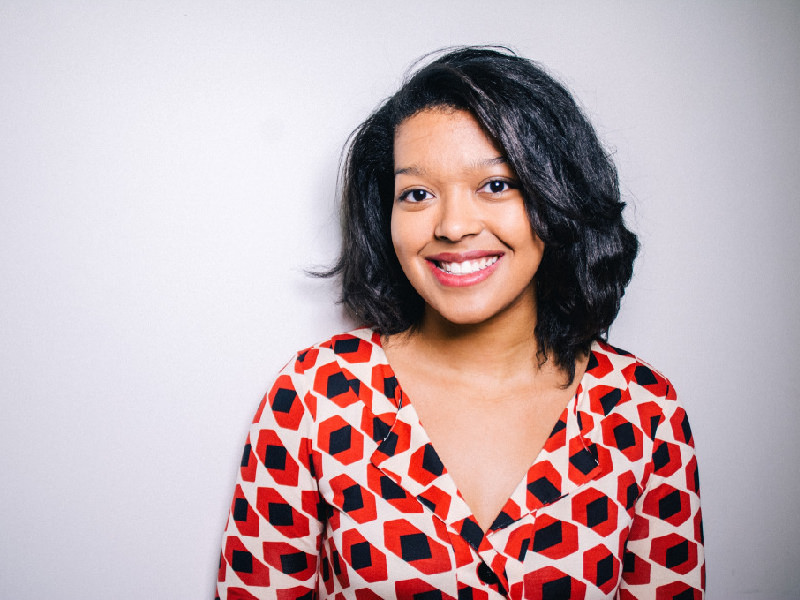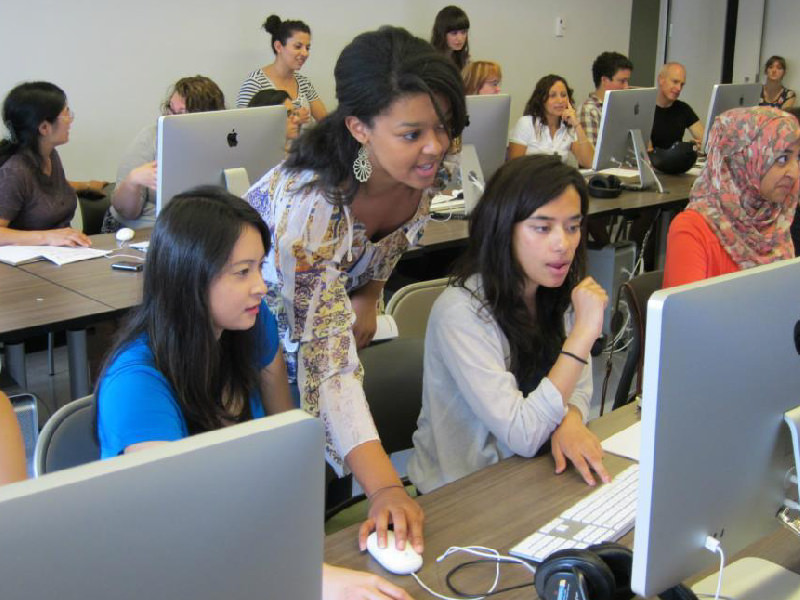|
By Muniyra Douglas The Tech industry, considered a predominately male-saturated sector, continues to evolve into a more inclusive landscape. Women in the industry, particularly women of colour, were almost non-existent to the public eye 30, or even 20 years ago. Were black women simply not as interested in tech developments then as they are now? Or were they not encouraged to exist within the space as a fully, formulated and educated member of society? The scenario has, imaginably, advanced with women functioning as CEOs of tech companies, creating start ups, developing innovative apps and teaching coding seminars (to other women). It is therefore, safe to say, we are in a perfect time within history to recognize and acknowledge women who work passionately in the tech sector. Especially young black women who are too often ignored in the private and public spheres. In this interview, VIBE Correspondent Muniyra Douglas speaks with Ashley Jane Lewis – Interactive Artist, Maker and Youth Tech Educator. Ashley, a Ryerson University graduate, was listed in the Top 100 Black Women to Watch in Canada (2016) She was profiled in Reader’s Digest (2014) for Black Youth in Tech Education (BYTE) which provides tech workshops for children of colour. Ashley has also featured as a keynote speaker for TEDx, FITC, International Women’s Day and Maker Faire. Muniyra: How did you get started in creative tech? Ashley: I came across an undergraduate program at Ryerson University that was a hybrid of technology and art. It taught [one] how to use circuits, electronics, code, web design, app design and other technological skills. It [also] taught you how to use those to create creative expression. I took the program and it was wonderful. I was [also] really geared towards social justice and looking at the world from a critical lens, in terms of innovation and change. That was my first start in coding and robotics and topics that weren’t really introduced to me before that undergraduate program. However, lots of the skillsets that go into being competent – or even just confident – in electronics and coding, I learned from my parents. They are very hands-on and spent a lot of time making sure I was creatively confident. So, when we had to learn how to use our hands to create circuits and work with electronic components, I was very comfortable diving into things that were tactile. Muniyra: Tell me about your teaching experience in Johannesburg. Ashley: It was a period of my life where I was teaching children how to code and how to work with circuits and electronics. (It) was part of a movement to help foster a sense of creativity in the field, but also to help break up the blatant consumerism in technology – to help people feel like they are agents of change and not consumers of technology. Prior to that I had worked for Girls Learning Code for a few years with young girls. But once I left that company, I wanted to work with young people of colour because I feel like there is still a question that needs a lot of time and energy in addressing. Where are the people of colour in technology? It’s not a diverse space in terms of the black identity. So, I started up a small company – we got to tag along with Google for their Google Geek Street Technology festival. We were incubated in the Ryerson Transmedia Zone. I went back to Ryerson to incubate this company and through the notoriety around it, I was able to get in touch with the Johannesburg Fak’ugesi Festival, a technology and arts festival in the city. They invited me to teach workshops to young kids in the area – it was an incredibly meaningful experience! It was so different from where we live – in incredibly positive ways. They are leaps and bounds ahead of us in terms of innovation and it was really fascinating to see. "It [Johannesburg] was so different from where we live -- in incredibly positive ways. They are leaps and bounds ahead of us in terms of innovation and it was really fascinating to see." © Tedx Talks | YouTube Muniyra: What about the need for diverse spacing for people of color? Ashley: I don’t think the space is available because it is largely held by white males. There are a lot of hurdles you have to overcome in order to feel like you’ve carved out any space for yourself – or that any space exists for the black identity, especially if you’re a black woman. In addition to that, the education systems that are offered in this programming, I think, need to be far more cognizant of equity. What I mean by this is in terms of hosting educational workshops in places that are predominately black, or spending extra time advertising to those demographics in order to get those young people to attend. It might be a little overzealous, but at the root of it all if a person of colour is really devout and interested in technology, there are navigable ways. Just like all people of colour at all times: having to navigate spaces that are not predominantly black. There are ways to navigate the tech industry – it’s challenging for sure, but I think there are ways to navigate it in our best interest, just like any [other] industry. But I think it’s missing the initial spark, having opportunity for that young person to see that this is a career path that they would like to take; or be inspired to access those workshops. Muniyra: How important are tech blogs or ‘Lists of people to watch’ for women and people of colour within the industry? Ashley: For me, the lists don’t have a greater opportunity to connect in any greater way, but on top of that I don’t really feel like their audience is the audience I need to connect with. I’m certainly flattered that I’m on these lists, but the audiences are still mostly white males. And I don’t have any reason to preach to that demographic. However, the top “100 Black Women in Canada to Watch” is far more closer aligned to the audience – largely women, largely people of colour – that is meaningful to me. I think the work that you do and the people you meet around that area of work are far more connected to the platform. "There are a lot of hurdles you have to overcome in order to feel like you’ve carved out any space for yourself – or that any space exists for the black identity, especially if you’re a black woman."
|
Recent Posts
Categories
All
Archives
February 2022
|
|
GET THE APP!
Listen to VIBE 105 anywhere you go!
|
OUR STATION
|
TUNE IN RADIO
|
STAY CONNECTED
|
Copyright © 2021 Canadian Centre for Civic Media and Arts Development Inc. Except where otherwise noted, presentation of content on this site is protected by copyright law and redistribution without consent or written permission of the sponsor is strictly prohibited.




 RSS Feed
RSS Feed


